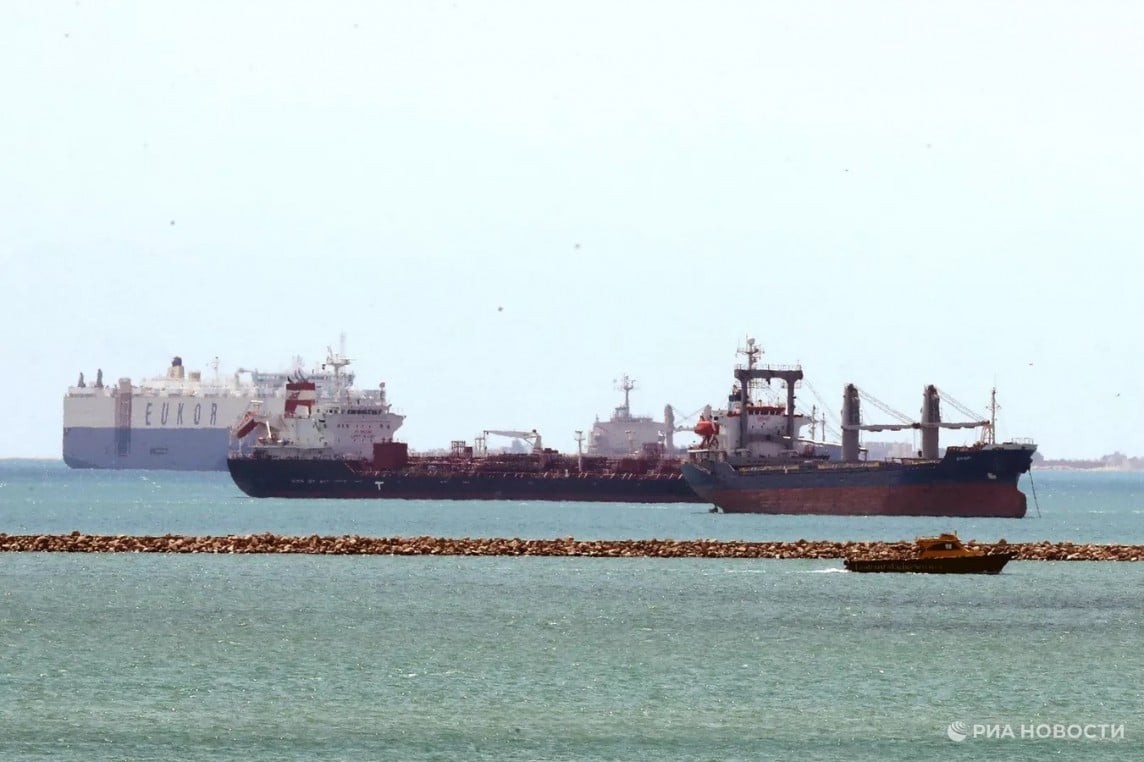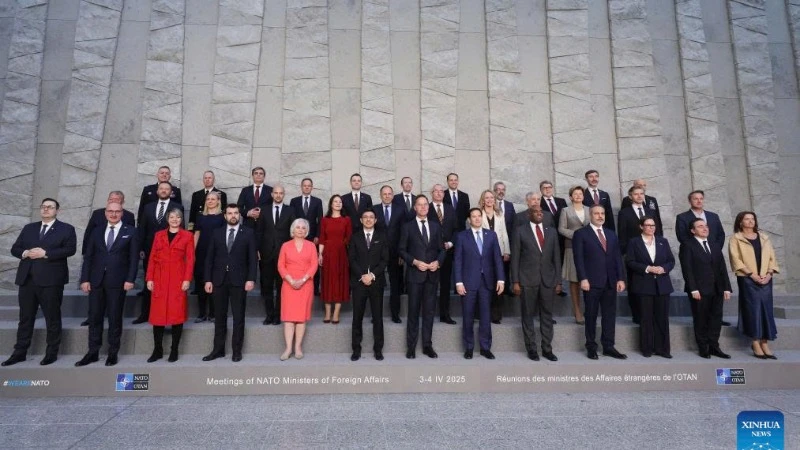The Red Sea reflects Europe's economic and military difficulties.
According to an article by Laurent Célérier, a lecturer at Sciences Po (France), published on the website of the Montaigne Institute, since the Houthi forces captured a cargo ship and announced it on November 20, 2023, the Bab el-Mandeb Strait has gone from being a strategic transit point, especially in the field of oil transportation, to an economic chokepoint. On November 20, when the merchant ship Galaxy Leader was captured by Houthi militia commandos in the southern Red Sea, it was widely reported in the media. This attack was a demonstration of the support of the Houthi armed group in Yemen for Hamas in opposing Israel's military operations in the Gaza Strip.
Six months later, when more than 50 attacks on ships passing through the Red Sea had occurred, damaging more than 15 vessels, the situation in the southern Red Sea region seemed to mirror Europe's economic and military difficulties.
The Bab el Mandeb Strait, a strategic chokepoint for international maritime trade and through which 12% of global shipping tonnage and 1 million barrels of oil a day pass, has become a highly volatile area, endangering shipping between Europe and Asia. In early April, the number of ships passing through the strait had dropped by 50% compared to 2023, from more than 500 ships per week to around 250.
This situation increases costs for shipowners: in insurance costs (up 100%) if the ship continues to pass through the Suez Canal or in transit times (up 38% on the Shanghai-Rotterdam route). These additional costs contribute to inflation, weigh on the economy and are ultimately borne by European consumers. Moreover, the unrest in the Red Sea sends a clear message: As soon as the lifeblood of global trade is blocked, the European economy - which depends on Gulf oil and has been maximizing its value chain to take advantage of low production costs in Asia - will suffer.
Operation Aspides faces major challenges
In response to the attacks in the Red Sea, countries with naval and air capabilities quickly appeared in the region, especially the United States with 3 destroyers, the United Kingdom and France each with 1 destroyer. On December 18, 2023, Washington took the initiative to form the "Prosperity Guardian" coalition (with the participation of 10 countries including the United States, the United Kingdom, Bahrain, Canada, France, Italy, the Netherlands, Norway, Spain and Seychelles) and conducted operations against the Houthis in the Red Sea. The above countries can participate at different levels, from sending frigates to seconding liaison officers.
Finally, on February 19, the European Council decided to launch a maritime safety operation called “Operation Aspides”, marking the European Union’s (EU) concrete commitment to ensuring maritime security in the region. Operation Aspides brings together 19 EU countries. However, so far, only 4 member states (including France, Germany, Italy and Greece) have participated at the highest level by sending frigates to participate in this operation.
In early April, the operation destroyed 10 UAVs, including 9 in the air and 1 on the surface, intercepted 4 ballistic missiles, successfully escorted 79 ships and met all escort requests, even for ships that had no direct contact with the EU.
However, these encouraging results do not hide the weaknesses of the campaign. First of all, in terms of a purely defensive mission. The commander of the campaign pointed out: “ We are not attacking the Houthis, although we could do so, but we have another mission. If we look at it from a military point of view, we find ourselves in the worst possible situation. In other words, we are always waiting to be their target .”
 |
| Since mid-November 2023, Houthi forces have deployed UAVs and missiles to attack international ships in the Red Sea. Photo: RIA Novosti |
Such a mission was the result of a trade-off between efficiency and minimizing the risk of escalation, which could compromise the safety of the crew. This, then, was the second weakness of the operation – the necessity of a last-minute response required impeccable operational preparation, which many European navies found difficult to achieve. Indeed, the German frigate Hessen almost accidentally shot down an American Reaper UAV and had trouble launching its RIM-162 missile.
The frigate Hessen left the operation on 23 April and its replacement is expected to arrive before August. The Belgian frigate Louise Marie, which departed Zeebrugge on 10 March, has yet to reach the area of operations following a RIM-7 Sea Sparrow missile incident. While the commander of the operation estimates that twice as many frigates are needed to re-establish the necessary level of security at sea, the EU’s ability to maintain four of these vessels in good condition at all times is a challenge.
Restoring maritime safety in the Red Sea
The situation in the Red Sea not only reflects a certain degree of caution in the operation, but above all reflects the fragility of European naval resources, a consequence of the continuous reduction in the size of the navy over the past 20 years: the number of EU frigates has decreased by more than 32% (from 1999 to 2018). All efforts to ensure security in the Red Sea rely largely on the French Navy - which accounts for about 20% of the EU's naval capabilities, constantly participates in the Red Sea operation and carries out the majority of interceptions.
Restoring the safety of navigation in the Red Sea is a priority and an opportunity for European navies. In the immediate future, it is necessary to rapidly increase the mobilization of naval resources that are available and in a satisfactory operational state in Europe. This also requires optimal coordination between Operation Aspides and the Guardians of Prosperity coalition, as well as with regional actors, especially Saudi Arabia and Egypt. Finally and above all, it is necessary to increase diplomatic leverage to put pressure on Iran, an ally of the Houthi forces.
In the medium term, it is necessary to improve the operational level of European navies through training and deployment of effective means of countering UAVs. Contributing to establishing a ceasefire in the Gaza Strip would also reduce tensions in the Bab el Mandeb Strait. However, there is no guarantee that the Houthis will stop carrying out attacks, as this is a way for them to highlight their “mission” on a global scale.
The situation in the Red Sea thus presents a picture of a Europe struggling to maintain its economic prosperity and protect its military interests. The Red Sea acts as a mirror reflecting the challenges and vulnerabilities that Europe faces, while also exposing its weaknesses and insecurities.
Source: https://congthuong.vn/khung-hoang-bien-do-va-bai-toan-ve-kinh-te-quan-su-chau-au-329058.html


![[Photo] General Secretary To Lam receives French Ambassador to Vietnam Olivier Brochet](https://vstatic.vietnam.vn/vietnam/resource/IMAGE/2025/4/17/49224f0f12e84b66a73b17eb251f7278)
![[Photo] Closing of the 4th Summit of the Partnership for Green Growth and the Global Goals](https://vstatic.vietnam.vn/vietnam/resource/IMAGE/2025/4/17/c0a0df9852c84e58be0a8b939189c85a)
![[Photo] National Assembly Chairman Tran Thanh Man meets with outstanding workers in the oil and gas industry](https://vstatic.vietnam.vn/vietnam/resource/IMAGE/2025/4/17/1d0de4026b75434ab34279624db7ee4a)
![[Photo] Nhan Dan Newspaper announces the project "Love Vietnam so much"](https://vstatic.vietnam.vn/vietnam/resource/IMAGE/2025/4/17/362f882012d3432783fc92fab1b3e980)

![[Photo] Promoting friendship, solidarity and cooperation between the armies and people of the two countries](https://vstatic.vietnam.vn/vietnam/resource/IMAGE/2025/4/17/0c4d087864f14092aed77252590b6bae)

























![[Photo] Welcoming ceremony for Chinese Defense Minister and delegation for friendship exchange](https://vstatic.vietnam.vn/vietnam/resource/IMAGE/2025/4/17/fadd533046594e5cacbb28de4c4d5655)


























![[Video] Viettel officially puts into operation the largest submarine optical cable line in Vietnam](https://vstatic.vietnam.vn/vietnam/resource/IMAGE/2025/4/17/f19008c6010c4a538cc422cb791ca0a1)







































Comment (0)